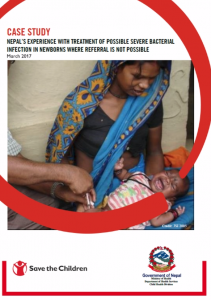
Background
Of all newborn deaths globally, about one in five can be attributed to possible severe bacterial infection (presumed cases of pneumonia, sepsis, or meningitis). In Nepal, as in other settings with high newborn mortality rates, the proportion appears to be higher. From the verbal autopsy module used in the 2006 Nepal Demographic and Health Survey [MoHP 2007], 39 percent of newborn deaths were categorized as due to serious bacterial infections (not including tetanus).
Historically, the standard of care for treatment of possible severe bacterial infection (PSBI) has been inpatient care using parenteral antibiotics. In the late 1990s, the SEARCH project, in a remote tribal area in Maharashtra state, India, demonstrated that using a primary healthcare approach in which trained and supervised community health workers (CHWs) identified and treated cases of PSBI in the home could substantially reduce newborn mortality [Bang 1999]. Recently published trials [AFRINEST 2015, Baqui 2015, Mir 2017] further validate the role of simplified antibiotic regimens for outpatient use for those cases of PSBI for which referral is not possible.
Why this case study?
In 2004, the Ministry of Health (MoH) and its partners—based on Nepal’s experience using community health workers to provide treatment services for infant and child acute respiratory infection (ARI) and diarrhea, along with the promising experience from SEARCH—began piloting an approach to PSBI that included treatment at peripheral-level primary healthcare facilities by non-physicians. This was subsequently scaled up nationally. The conditions in which this program has been delivered are similar to those in many other areas of South Asia.